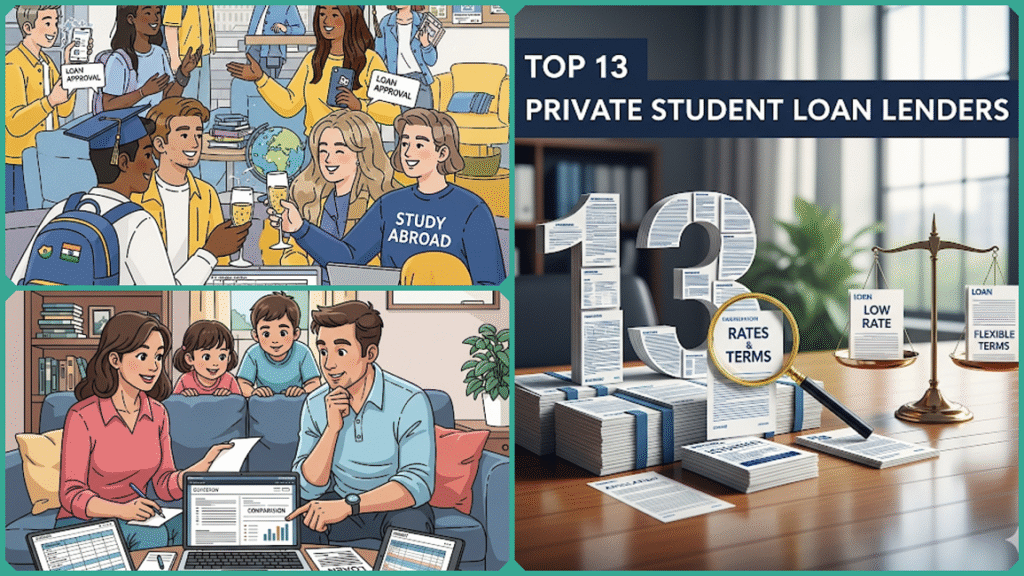Top 13 Private Student Loan Lenders: Rates, Terms, and More
Estimated reading time: 23 minutes
Paying for college has become an increasingly complex and challenging task for students and their families, especially after they have already maximized all available federal loans, scholarships, and grants. For many individuals, private student loans are often used to fill the remaining “funding gap” that other sources do not cover.
However, navigating through the vast number of Private Student Loan Lenders, the wide range of varying interest rates, and the diverse and often complex loan terms can feel incredibly overwhelming and confusing. This complexity makes it significantly challenging for borrowers to confidently make the best and most informed financial decisions regarding their education funding.
This comprehensive and definitive guide thoroughly covers the Top 13 Private Student Loan Lenders for the year 2025, offering detailed and clear insights into crucial aspects such as interest rates, repayment terms, credit requirements, and borrower benefits.

Whether you are an undergraduate student just starting your academic journey, a graduate student pursuing advanced degrees, or a parent acting as a cosigner, gaining a deep understanding of these Private Student Loan Lenders is essential. This knowledge empowers you to make an informed decision and select the best lender that fits your unique financial situation and future goals.
This post is designed to empower readers by providing them with the essential knowledge and understanding needed to make confident, well-informed, and cost-conscious student loan decisions. It aims to build trust with the audience by offering expert insights coupled with thorough, data-driven analysis that supports every recommendation and conclusion presented.
Key Concepts and Terms in Private Student Loans
Before comparing different Private Student Loan lenders, it is crucial to have a clear understanding of the essential features of loans. This knowledge empowers you to make well-informed and confident decisions when choosing the best student loan option for your needs. Taking the time to grasp these key loan characteristics will greatly assist in evaluating and selecting the right lender with confidence.
Fixed vs. Variable Interest Rates
- Fixed Interest Rate: The interest rate remains constant and unchanging throughout the entire duration of the loan, offering borrowers stability and predictability in their monthly payment amounts. This consistency helps borrowers plan their finances more effectively and avoid any unexpected fluctuations or surprises in their repayment schedule.
- Variable Interest Rate: The interest rate on this type of student loan can change periodically, depending on fluctuations in a benchmark rate such as the prime rate or LIBOR, plus an additional margin set by the Private Student Loan lender. Typically, the initial rate for variable interest loans starts lower than comparable fixed rates, making them attractive at the outset. However, because the rate can increase over time, monthly payments may rise, sometimes significantly, depending on market conditions. To provide some level of protection and predictability for borrowers, many variable-rate student loans include a cap on the maximum interest rate, which limits how high the rate can go and helps prevent extreme increases that could cause financial strain.
Repayment Terms
- The repayment term refers to the total length of time that borrowers are given to fully repay their loan amount. For private student loans, this period typically ranges anywhere from 5 to 20 years, depending on the Private Student Loan lender’s terms and the borrower’s specific agreement. This timeframe determines how long the borrower will be making monthly payments until the student loan balance is completely paid off.
- Shorter loan terms result in higher monthly payments, but they also lead to paying less total interest over the life of the loan. On the other hand, choosing longer loan terms lowers the amount you need to pay each month, making monthly payments more affordable, but this comes with the drawback of accumulating more total interest costs over time. Having a clear understanding of this tradeoff is crucial because it enables borrowers to make informed decisions and select student loan terms that align most effectively with their individual budgets and financial goals.
Cosigner
- A cosigner is an individual, often a parent, relative, or close family member with a strong and reliable credit history, who agrees to take responsibility for repaying the loan if the primary borrower is unable to make the payments or defaults on the loan. This person essentially guarantees the student loan, providing additional security to the Private Student Loan lender.
- Most private loan lenders typically require a cosigner for students who have limited or no established credit history. This is because a cosigner provides additional security to the lender by guaranteeing the loan repayment. However, some Private Student Loan lenders offer specialized no-cosigner loans designed specifically for students without a credit history. These student loans usually require the borrower to provide proof of steady income, demonstrate strong academic performance, or show enrollment in a professional school or graduate program as part of their eligibility criteria.
Grace Period
- This is a specific and fixed period, typically lasting between 6 to 9 months after a student graduates or their enrollment status falls below half-time. During this designated timeframe, borrowers are not obligated to make any loan payments, providing them with temporary financial relief as they transition out of school or adjust to new circumstances.
- The grace period provides recent graduates with a valuable window of time to secure employment and establish financial stability before they are required to begin making student loan repayments. This transitional period is especially important as it offers borrowers a chance to focus on job searching without the immediate pressure of loan payments. However, it is important to note that not all private loans include a grace period, so it is essential to carefully verify the specific terms and conditions with the private Student Loan lender to fully understand when repayment obligations will commence.
Origination Fees
- Some Private Student Loan lenders impose a one-time origination fee at the very beginning of the loan process to cover various administrative and processing costs. This upfront fee effectively reduces the total amount of money you actually receive from the student loan, as it is deducted before the funds are disbursed to you.
- Many of the leading private Student Loan lenders in the market nowadays often waive origination fees as part of their loan offerings, making them more attractive to borrowers. However, it is crucial to carefully review all the loan terms and conditions to ensure you do not encounter any unexpected costs or hidden charges later on. Always double-check the fine print before committing to any student loan agreement.
Repayment Flexibility
Many private student loan lenders provide a wide variety of repayment plans that are designed to accommodate different financial situations and preferences, such as:
- Deferred payments: No payments are required while you are enrolled in school; however, please be aware that interest may continue to accrue during this period.
- Interest-only payments: During the time borrowers are enrolled in school, they have the option to pay only the interest on their loan. This approach helps to reduce the total amount of interest that accumulates over the life of the student loan, ultimately lowering the overall cost of borrowing. By making interest-only payments while studying, borrowers can manage their finances more effectively and avoid the buildup of unpaid interest that can increase their debt burden after graduation.
- Immediate payments: Full principal and interest payments begin right away without any delay, ensuring that repayment starts immediately from the very first scheduled payment date.
- Partial interest payments: A predetermined fixed sum that covers only a portion of the total interest owed, effectively reducing the amount of interest that continues to accrue over time. This approach helps in managing the overall interest burden by lowering the cumulative interest balance.
Some Private Student Loan lenders also offer options for deferment or forbearance during periods of financial hardship, allowing borrowers temporary relief from making payments. However, these options are generally less generous and less flexible compared to the protections provided by federal loan programs.
These Private Student Loan lender-specific assistance programs often come with much stricter eligibility requirements and typically offer shorter durations of financial relief, which can make them a less comprehensive and less reliable safety net compared to the more robust and widely available federal options.
Gaining a thorough understanding of these essential key terms and fundamental concepts thoroughly equips prospective borrowers and cosigners with the necessary knowledge to:
- Evaluate loan offers accurately by thoroughly analyzing all the terms and conditions involved. Carefully compare interest rates, repayment schedules, fees, and any additional charges to ensure you fully understand the financial commitment. This detailed evaluation helps you make well-informed decisions that suit your budget and long-term financial goals.
- Carefully balance both the overall cost and the flexibility of the student loan terms to ensure you choose an option that fits your financial situation and long-term goals. Consider how different interest rates, repayment schedules, and potential penalties might impact your budget and ability to adapt to changing circumstances.
- Anticipate your repayment obligations realistically and practically, taking into account all possible factors that might affect your ability to meet those commitments on time. It’s important to thoroughly evaluate your financial situation and plan accordingly to ensure you can fulfill your repayment responsibilities without undue stress or difficulty.
- Make sure to ask well-informed and thoughtful questions throughout the entire student loan application process to fully understand all the details and requirements involved. This will help you make more confident decisions and avoid any misunderstandings later on.
This foundational knowledge serves as a crucial base that empowers individuals to make more informed and accurate comparisons across the leading private student loan lenders. By understanding the key factors and nuances involved, borrowers are better equipped to evaluate their options thoroughly, which ultimately leads to making smarter and more strategic financial decisions that can positively impact their long-term financial health.
The Top 13 Private Student Loan Lenders for 2025
Securing your college education often means navigating the world of private student loans. In 2025, finding the right lender is more important than ever. With countless options available, comparing rates, terms, and features is crucial to minimizing your overall cost and finding a student loan that fits your financial situation. We will provide a detailed breakdown of the top 13 private student loan lenders, helping you make an informed decision on your financial journey.
| Lender | Interest Rate Range (APR) | Loan Terms (years) | Cosigner Requirement | Special Features | |
|---|---|---|---|---|---|
| College Ave | 2.89% – 17.99% (Fixed) | 5, 8, 10, 15, 20 | Optional | Flexible repayment plans; customizable in-school payment options; profession-specific grace periods | Quick approval; borrower-controlled repayment flexibility |
| Sallie Mae | Approx. 3.25% – 16% (Varies) | 5, 10, 15 | Usually required | Specialized loans for law, medical, dental, certificate, and other programs | Multi-year approval; free credit score monitoring |
| Ascent | 2.89% – 14.93% (Fixed) | 5, 7, 10, 12, 15, 20 | Not always required | No-cosigner loans based on GPA, graduation date, and income potential | Cash-back graduation rewards |
| SoFi | 3.18% – 15.99% (Fixed) | 5, 7, 10, 15 | Optional | Member benefits: cosigner release after 12 months; no fees | Loyalty discounts; GPA cash bonuses |
| Earnest | 3.24% – 14.30% (Fixed) | Variable | Required for internationals | No fees; supports undergrad and grad; multiple repayment options | 9-month grace period; forbearance options |
| ELFI | Similar to SoFi and Sallie Mae | Up to 15 | Required | Refinancing options; flexible repayment plans | No prepayment penalties |
| Marcus by Goldman Sachs | 3.49% – 11.99% (Fixed) | 5, 7, 10 | Required | No fees; straightforward loan terms | Trusted direct lender |
| Citizens Bank | 5.30% – 14.49% (Fixed) | 5, 7, 10, 15 | Required | Multi-year approval; cosigner release | Interest rate discounts for autopay |
| LendKey | 4.00% – 13.74% | 5 – 15 | Usually required | Partners with community banks, providing competitive rates | Competitive interest rates |
| PNC Bank | 6.00% – 14.99% | 10, 12, 15 | Required | Multi-year approval; cosigner release | Discounts for autopay |
| Discover | 3.99% – 14.74% (Fixed/Variable) | 5, 7, 10, 15 | Required | No fees; available to undergrad and grad students | Rewards for good grades |
| Lendwise | Varies based on underwriting | Varies | Optional | Focused on graduate and professional students | Customizable repayment options |
| MPOWER Financing | 6.00% – 14.00% (Fixed) | 5 – 10 | Not required | Designed for international students | Credit-building benefits |
Highlights and Insights
- College Ave excels for borrowers seeking flexible repayment controls and profession-specific grace periods, suitable for future healthcare or law professionals needing tailored plans.
- Sallie Mae uniquely covers a broad array of specialized programs, from medical residencies to trade schools, making it ideal for non-traditional or advanced degree students.
- Ascent is notable for its no-cosigner loans based on academic merit and potential income, a great option for credit-challenged borrowers seeking independence from cosigners.
- SoFi stands out with its member perks, such as GPA cash bonuses, no fees, and the ability to release cosigners early, appealing to those wanting added value beyond rates.
- Earnest is praised for its broad borrower protections, including a lengthy grace period and flexible forbearance, which help manage payments during life’s challenges.
- MPOWER Financing uniquely serves international students without cosigner requirements, a critical niche underserved by most Private Student Loan lenders.
Borrowers should take the time to carefully evaluate not only interest rates and loan terms but also important factors such as cosigner requirements, the flexibility of repayment options, and any available borrower rewards to find the loan that best fits their individual financial situation and goals.
Expert Tips for Choosing the Right Private Student Loan Lender
- Always make sure to carefully compare personalized student loan offers, as the interest rates and terms can vary significantly depending on your creditworthiness and the specific purpose of the loan. Taking the time to evaluate multiple options helps ensure you find the best possible deal tailored to your financial situation and borrowing needs.
- Prioritize selecting private Student Loan lenders who offer the valuable option of a cosigner release if a cosigner is involved in the loan agreement, as this feature can significantly ease long-term financial obligations and provide greater flexibility for both the borrower and the cosigner over time.
- Look specifically for no-fee loans, as these financial options can significantly help in minimizing any upfront costs that you might otherwise have to pay. Choosing no-fee loans is a smart way to reduce your initial expenses and make the borrowing process more affordable right from the start.
- Consider the value of additional borrower perks such as autopay discounts, graduation rewards, or GPA bonuses that can significantly lower the effective costs associated with your loan. These extra benefits not only help reduce your overall expenses but also encourage timely payments and academic achievement, ultimately making your borrowing experience more affordable and rewarding.
- Don’t overlook the importance of exploring specialized student loans that are specifically tailored for students pursuing degrees in medical, dental, or law fields, if applicable to your situation. These loans are designed to meet the unique financial needs and challenges faced by students in these demanding professional programs.
This comprehensive private student loan lender comparison is carefully compiled using the most recent verified data, along with detailed expert reviews, designed to provide prospective borrowers with reliable and trustworthy information. It aims to deliver actionable insights that will help individuals confidently navigate the complex private student loan market in the year 2025, making well-informed borrowing decisions.
Current Trends and Innovations in Private Student Lending
The private student loan market in 2025 is characterized by a variety of important trends and groundbreaking innovations that significantly improve the overall borrower experience, increase accessibility for a wider range of students, and offer greater flexibility in loan terms and repayment options:
Increased Flexibility in Repayment Plans
Private Student Loan Lenders such as College Ave and Ascent have significantly expanded their range of repayment plan options to better accommodate the diverse needs of borrowers. These options now include interest-only payments during the time students are still enrolled in school, as well as flat payment choices that provide predictable monthly amounts.
These more flexible and adaptable repayment plans are designed specifically to support borrowers who may be juggling part-time jobs, internships, or fluctuating income streams. By offering these tailored repayment solutions, Private Student Loan lenders help reduce the financial stress that many students face while pursuing their education, making it easier for them to manage their finances responsibly throughout their academic journey.
Expansion of No Cosigner Loan Options
Ascent and MPOWER Financing stand out in the financial industry for offering student loans that do not require cosigners, which represents a significant and impactful innovation, especially for students who have limited or no established credit history.
These Private Student Loan lenders employ alternative underwriting criteria beyond traditional credit scores, taking into account factors such as academic performance, expected future income, and anticipated graduation dates to assess a student’s creditworthiness. This approach effectively broadens access to educational financing for a wider range of students who might otherwise struggle to secure loans through conventional means.
Borrower Rewards Programs
SoFi and Discover are leading the market by offering a variety of incentives that specifically reward responsible financial behavior. These incentives include unique features such as GPA-based cash bonuses and loyalty discounts, which serve as motivating factors for borrowers.
By providing these perks, the companies encourage students and borrowers to maintain good academic standing as well as stay consistent with their loan payments. This approach not only helps individuals manage their finances more effectively but also contributes significantly to lower default rates.
Additionally, these valuable incentives significantly enhance overall borrower satisfaction by fostering a supportive and encouraging environment that actively rewards positive financial habits as well as academic achievement, thereby motivating borrowers to maintain responsible behavior and strive for excellence in their studies.
Digital and Speedy Application Processes
A significant transformation in the financial sector is the widespread adoption of fintech-driven, highly streamlined digital processes. Applications that previously required several weeks to process and approve can now be completed and finalized within just a few minutes, thanks to advanced online portals that utilize AI-driven underwriting and sophisticated data analytics.
This rapid approval process provides students with timely access to necessary funds, which is essential for effectively managing and meeting urgent tuition payment deadlines and other related financial obligations.
Cosigner Release Options
An increasing number of Private Student Loan lenders, such as SoFi and Citizens Bank, now provide the option of cosigner release after the borrower has made a series of consistent on-time payments, typically over a period of 12 months. This important development significantly reduces the long-term financial obligations for cosigners, offering them relief from ongoing liability.
By introducing this feature, private loans have become much more appealing to families who are cautious about taking on extended financial responsibility for their loved ones. This innovation helps ease concerns and encourages more borrowers to consider private loan options with greater confidence.
Additional Context
These developments reflect a broader industry pivot towards borrower-centric, technology-enabled models. Fintech platforms disrupt traditional banking by offering personalized student loans, lower fees, and better user experience.
Regulatory changes emphasize income-driven and flexible repayment designs to mitigate borrower stress in an environment of rising tuition and economic uncertainty. Younger, digitally fluent borrowers also drive demand for mobile-first loan products paired with employer tuition benefits.
Collectively, these innovations improve access, encourage responsible borrowing, and support repayment success — moving private student lending beyond rigid, one-size-fits-all solutions toward adaptable, transparent, and customer-friendly financing.
Case Studies and Examples
Numbers and data are undoubtedly helpful for gaining insight, but they never tell the entire story on their own. To truly grasp the full impact of student loans, it is essential to examine real-world scenarios and personal experiences.
The following case studies and examples highlight how different students, each with unique financial backgrounds and circumstances, used loans from some of the top lenders to finance their education. These detailed stories will clearly illustrate the practical application of the various rates, terms, and features that have been discussed throughout this comprehensive guide.
Alex: Undergraduate Student with Limited Credit History
Alex is a junior undergraduate with minimal credit history and no cosigner available. He chooses Ascent because of its no-cosigner loan options that evaluate creditworthiness based on academic performance, graduation date, and potential future income rather than current income alone. Alex qualifies for a fixed interest rate of around 4.5%, benefiting from the option to make interest-only payments while in school.
This eases his monthly cash flow and helps him avoid accruing excessive interest before graduation. Additionally, Alex aims to enroll in autopay to qualify for Ascent’s 1% cash-back graduation reward—an extra financial benefit after repayment starts. Ascent’s flexibility and accommodating parameters make it ideal for students like Alex who need private loans without relying on a cosigner.
Maria: Law Student Requiring Specialized Loans
Maria is entering law school and needs multi-year financing specific to her professional program. She selects Sallie Mae for its specialized student loans tailored to law, medical, dental, and certificate programs. Sallie Mae’s multi-year approval process allows Maria to secure funding for all three years of law school in a streamlined manner, reducing paperwork and administrative hassle beyond the initial application.
Maria appreciates Sallie Mae’s reputation, competitive interest rates (typically ranging from about 3.25% to 16%), and borrower perks like free credit score monitoring that help keep her financially informed throughout law school. Sallie Mae’s loan flexibility and professional degree focus are well-suited for Maria’s educational journey.
The Smiths: Parents Cosigning for Their Child’s Tuition
The Smith family is cosigning for their daughter’s undergraduate education. They chose College Ave because it provides flexible repayment terms, such as varying loan lengths from 5 to 20 years, and customizable in-school payment options. The repayment plans include grace periods tailored for specific professions, which works perfectly as their daughter is pursuing a healthcare-related degree.
College Ave’s quick approval process and repayment control features ease financial planning for the Smiths. They also value that cosigner release is possible after their daughter makes consistent payments, reducing their long-term financial liability once she establishes her credit.
These case studies provide a detailed look at common borrower profiles encountered in the student loan market: students who have limited or no credit history and are specifically seeking loans that do not require a cosigner, candidates enrolled in professional degree programs who require specialized funding tailored to their advanced education needs, and families who are exploring flexible student loan options that involve parent cosigners to support their children’s education.
Each lender offers unique features and benefits designed to address different financial situations and priorities, highlighting the critical importance of thoroughly evaluating one’s personal circumstances and financial goals before making a commitment to a private student loan.
FAQs
What is the main difference between federal and private student loans?
Federal student loans are funded and backed by the government, offering fixed, generally low-interest rates, income-driven repayment plans, and more borrower protections like loan forgiveness options. Private student loans are issued by banks or lenders and are credit-based, with rates that can be fixed or variable and terms that depend heavily on the borrower’s or cosigner’s creditworthiness. Private loans typically have fewer flexible repayment options and borrower protections.
Can I get a private student loan without a cosigner?
Some lenders like Ascent and MPOWER Financing offer no-cosigner loans, but usually with additional eligibility criteria such as good academic performance, anticipated future income, or U.S. residency. Without a cosigner, approval depends more on the borrower’s own financial and academic qualifications, which can be challenging for undergraduates with limited credit history.
How do fixed and variable interest rates affect my loan?
Fixed interest rates remain the same over the life of the student loan, giving payment stability and predictable budgeting. Variable rates, often starting lower, can fluctuate based on market benchmarks, potentially raising or lowering monthly payments in the future. Variable rates carry more risk but can offer cost savings if rates remain low.
What are typical repayment terms for private student loans?
Repayment terms usually range from 5 to 20 years. Shorter terms mean higher monthly payments but less overall interest paid, while longer terms reduce monthly payments at the cost of more total interest. Many lenders offer flexible term lengths to let borrowers choose based on their budget and financial goals.
Are there any fees I should watch out for?
Some private lenders charge origination fees (a one-time fee charged when the loan is issued) or late payment fees. However, many top lenders such as SoFi, Earnest, and College Ave do not charge origination or prepayment penalties. It’s important to read the loan agreement details carefully to avoid unexpected fees.
What are cosigner requirements for private student loans?
Cosigners are typically required for borrowers with limited or poor credit histories. A qualified cosigner usually needs a minimum credit score (often above 700), a low debt-to-income ratio, stable income, and a clean credit history. Commonly, parents or close relatives cosign, but friends or trusted adults can also qualify. The cosigner is equally responsible for student loan repayment, and missed payments can affect their credit.
Can I release my cosigner later?
Some lenders allow cosigner release after you’ve made a set number of on-time payments (often 12 months or more) and meet creditworthiness criteria on your own. This lets you assume full loan responsibility and relieves the cosigner of further obligation. Not all lenders offer this, so check before applying.
In Conclusion
Choosing the right private student loan is essential for managing college debt responsibly and ensuring financial stability throughout and after your education. The top 13 lenders for 2025 provide a diverse and comprehensive range of loan options designed to meet the unique needs of different borrower profiles.
These options include loans that do not require a cosigner, student loans that come with valuable member benefits, and those offering highly flexible repayment plans to accommodate various financial situations. When prospective borrowers are in the process of selecting a lender, they should carefully consider and evaluate the following important factors:
- Evaluate fixed versus variable interest rates according to their risk tolerance, considering that fixed rates provide payment stability while variable rates may start lower but fluctuate.
- Consider repayment flexibility and grace periods to align with anticipated career paths and cash flow needs.
- Assess the need for a cosigner and whether cosigner release options are available to ease long-term obligations.
- Check for fees and borrowers’ perks that can reduce overall loan costs, such as autopay discounts, rewards, and no origination fees.
For borrowers who have limited credit history or are international students, lenders such as Ascent and MPOWER work to expand access by using alternative criteria beyond traditional credit scores. These lenders focus on providing opportunities to those who might otherwise face challenges in securing funding.
Additionally, specialized student loans tailored specifically for professional degree programs are effectively offered by lenders like Sallie Mae and College Ave, catering to the unique needs of these students. It is especially important for all borrowers to carefully compare personalized loan quotes and review the terms and conditions thoroughly before making a final commitment to ensure they select the best option available to them.
Making a well-informed and carefully educated choice today can significantly contribute to a more manageable, smoother, and ultimately successful repayment experience in the future. Taking the time to understand your options now will help you avoid unnecessary difficulties and ensure greater financial stability down the road.
This conclusion highlights the extensive and varied eligibility requirements and selection criteria that apply to private student loans, underscoring the critical importance of conducting a thorough and individualized assessment for each applicant. This approach is essential to ensure that borrowers are matched with the most suitable loan options based on their unique financial situations.
The emphasis on personalized evaluation is strongly supported by recent industry data and insights from expert sources, which collectively reinforce the need for careful consideration of each borrower’s specific circumstances when determining student loan eligibility and terms.
Discover more from Skill to Grow
Subscribe to get the latest posts sent to your email.






